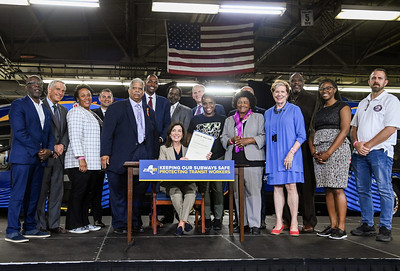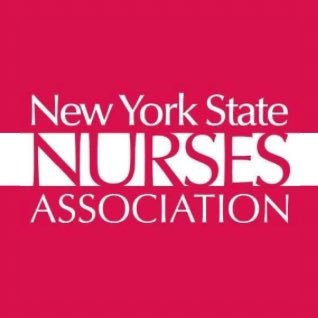New York, NY – Just several weeks after transit agency top management and union leaders wrote urging Albany to address the dramatic spike in violent assaults on transit workers with stiffer penalties and a broader definition of protected workers, Governor Kathy Hochul signed legislation to do just that.

(Marc A. Hermann / MTA)
Under the legislation signed on June 27, attacking transit workers on the job is a second degree felony punishable by up to seven years in jail. The new law now defines transit workers to include station customer assistants, ticket or revenue collectors, maintenance workers, repairers, cleaners, and their supervisors, who are not protected by existing law.
Boosters of the legislation estimate an additional 11,000 bus and subway lines as well as commuter rail service employees on the Long Island Rail Road and MetroNorth are also now covered. The previous law was limited to mass transit job titles like subway train operator or conductor.
“During the pandemic, our transit workers were heroes, showing up while everyone was staying home — putting not only their health and the health of their families at risk, but also risking their lives as subway crime increased,” Governor Hochul said at the June 27 singing ceremony. “New York’s transit workers have always been there for us and now it is our job to be there for them. No one should be subjected to physical violence or harassment in the workplace, and today we are taking an important step in protecting the men and women who keep our subways and buses running.”
“Transit workers come to work to do a job, not wind up in the emergency room,” said TWU Local 100 President Tony Utano. “We deserve respect from riders and from the law” adding that the law was “a step in the right direction. Prosecutors and judges must now do their job and hold people accountable for their actions.”
“As unprovoked, violent attacks against MTA employees continue to rise, it is imperative that our MTA Supervisors receive the same legal protections as every other MTA employee,” wrote Mike Carrube, the president of the Subway Surface Supervisors Association, in a statement to LaborPress. “After years of vigorously lobbying to include our members in the Assault Bill, I am deeply grateful to Governor Hochul for signing this critical legislation that finally includes my members and will send a powerful message to their assailants that they will be prosecuted with a felony charge for their crimes committed against us.”
Back in May, following a spate of assaults, including the Sunset Park subway mass shooting in which ten people were wounded, MTA Chair and CEO Janno Lieber as well as other transit agency bosses joined with a coalition of union leaders to write Senate Majority Leader Andrea Stewart-Cousins and Assembly Speaker Carl Heastie to urge them to address the troubling trend. While assaults on transit workers had been a serious issue before COVID, it got even worse during the pandemic when the public was required to comply with public health protocols including wearing a mask.
According to the MTA, in 2021 there were a total of 117 physical assaults and 2,380 incidents of employee harassment reported. The increased incidence of workplace violence occurred as thousands of workers in the transportation sector were sidelined by the killer virus which took the life of 170 MTA workers.
“MTA frontline workers have been heroic during the COVID pandemic, keeping the New York City metropolitan region moving,” the management labor coalition wrote Albany. “Unfortunately, however, in recent years there has been an trend of increasing attacks on transit workers” on “a day-to day basis, including punching, spitting, pushing and other violent behavior,”
The letter was also signed by Transport Workers Union Local 100 president Tony Utano; Mark Henry, president of the Amalgamated Transit Union Local 1056; Daniel Cassella, president of the Amalgamated Transit Union Local 726; Anthony Simon of the Long Island Railroad; Edward Valente of the Association of Commuter Rail Employees and Michael Carrube, president of the Subway Surface Supervisors Association.
Earlier this month, an MTA bus driver had to be hospitalized after being stabbed in the stomach while operating a shuttle bus to accommodate overnight subway riders on the Q line that had to have service suspended for track maintenance. According to press reports, the 39-year-old bus operator was also slashed in the face and had to also fend two other assailants brandishing a box cutter.
“This is a regular working-class guy who was doing the business of the city, making sure people could get where they needed to go when the subway was down, and he was subjected to an unprovoked and horrible attack,” TWU Local 100 President Tony Utano told Fox News. “This criminal must be caught, and he should get the maximum penalty under the law.”
In January, in New Jersey the Motorbus and Passenger Rail Service Employee Violence Prevention Act took effect which increased the penalties for attacking transit workers and allowed the agency to ban offenders for as long as a year or for their lifetime if the attack involved a deadly weapon. In 2020, the agency recorded 158 assaults on transit workers. The next year it was 183, more than three times the normal number of reported annual assaults, with fewer riders.
The problem of assault on the nation’s bus operators and other mass transit workers has become so acute that the $1.2 trillion bi-partisan infrastructure bill signed into law by President Biden last year requires the nation’s mass-transit systems to develop strategies to combat assaults on transit workers with provisions for withholding Federal money if agencies fail to comply.
“When we think of the impact of COVID on workers we usually think of their exposure to the virus, but we have to include this increasing workplace violence that’s also been part of the pandemic,” said Charlene Obernauer, the executive director of the New York Committee of Safety & Health, a workplace safety education non-profit supported by unions.
According to the AFL-CIO, workplace violence was a problem even before the pandemic.
In the national union’s “Death on the Job: The Toll of Neglect 2021” report, workplace violence death “increased to 841 in 2019, while more than 30,000 violence-related lost-time injuries were reported.” Workplace violence is the third-leading cause of death with “women workers being at greater risk of violence than men.” According to the national unions “there is no federal OSHA standard to protect workers from workplace violence.”
“Yes, it was a concern before the pandemic especially for late night retail and transit like busses and taxisand then for some industries like the grocery sector that were enforcing mask policies during the pandemic which made workers targets,” said Rebecca Reindel, the AFL-CIO’s director of occupational safety and health. “Health care and social assistance is where we have the highest rates of assaults.”






